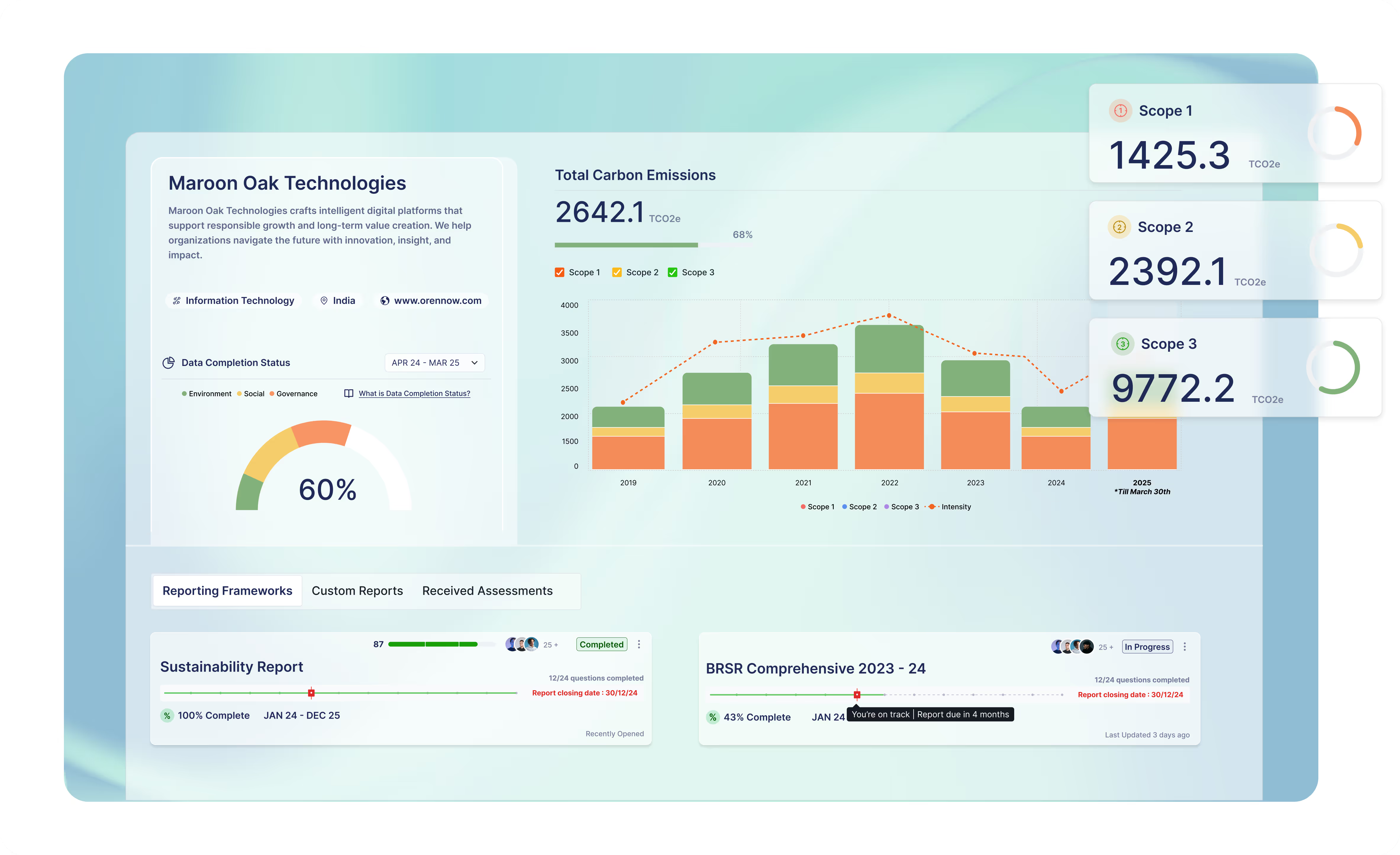ESG Reporting For Businesses Beyond A Compliance Checklist

What is ESG reporting?
ESG reporting is the systematic disclosure of a company’s activities and performance across Environmental, Social, and Governance areas. These reports provide both qualitative and quantitative insights. It tells how a company operates and impacts its stakeholders. The elements typically included in an ESG report are:
- Environmental: Energy usage, waste management, and sustainability initiatives
- Social: Employee well-being, diversity and inclusion, and community engagement
- Governance: Board structure, transparency, and ethical practices
What is the Importance of ESG Reporting in Modern Business?
ESG reporting is a reflection of a company’s commitment to responsible and sustainable business practices. By sharing information on environmental impact, social responsibility, and governance practices, companies gain insights and opportunities in several areas. Transparent ESG disclosures are very important in terms of:
- Brightening corporate reputation
- Supporting lasting value creation
- Identifying areas for improvement
- Setting measurable sustainability targets
- Tracking performance over time
Companies that integrate ESG into their core strategy not only strengthen their reputation but also position themselves for long-term growth and resilience.
Why is ESG Critical for India?
In India, ESG reporting has become a driver of responsible and sustainable business practices. The Business Responsibility and Sustainability Report (BRSR) framework encourages companies to disclose their environmental, social, and governance performance. It helps them operate transparently and ethically.
Companies engaged in international trade must also consider global ESG regulations, such as the EU’s Carbon Border Adjustment Mechanism (CBAM), which affects businesses with high carbon footprints.
Strong ESG practices enable businesses to:
- Improve corporate governance to build trust, ensure transparency, and attract investors.
- Address social issues like poverty, inequality, and workforce welfare to create a more inclusive economy.
- Enhance global competitiveness by aligning operations with international ESG benchmarks.
- Support India’s sustainable development goals through responsible, long-term business strategies.
The Benefits and Challenges of ESG Reporting
Here’s how ESG reporting benefits organisations:
- Compliance and credibility: ESG reporting helps companies to meet the mandatory ESG disclosure requirements. Thus, it strengthens stakeholder trust and reduces regulatory risks.
- Informed decision-making: The insights from ESG data reporting and the actual ESG assessment reports prove very useful for organisations. They can easily find out their areas for improvement and set proper resource use. They implement responsible business strategies.
- Investor attraction: ESG reports demonstrate a company’s commitment to responsible business practices. It makes it more appealing to investors who prioritise sustainability and ethical operations.
- Brand reputation and trust: Publicly sharing a corporate sustainability report signals transparency, building loyalty among customers, employees, and communities.
- Innovation and efficiency: Tracking ESG performance encourages companies to develop business strategies for sustainable development, reduce environmental impact, and uncover operational efficiencies.
Despite its benefits, ESG reporting comes with hurdles:
- Data management: Companies need specialised systems to collect reliable ESG reporting data on emissions, energy, water use, etc.
- Ensuring accuracy: Credible sustainability reporting demands rigorous verification processes to prevent errors and avoid greenwashing.
- Regulatory complexity: Companies have to regularly go through the changing standards for sustainability reporting across jurisdictions.
- Balancing stakeholder expectations: The ESG goal setting and resource allocation become difficult to handle when the priorities of investors, employees, and stakeholders.
Therefore, the solution is that the businesses have to address these challenges to drive long-term resilience and competitive advantage.
What do ESG Reports Include?
ESG reports provide both qualitative and quantitative insights, making them actionable for investors and stakeholders evaluating sustainability reporting ESG performance.
| ESG Dimension | Key Inclusions in ESG Reports | Examples |
|---|---|---|
| Environmental | GHG Emission Baseline (Scope 1, 2, and 3) Climate change mitigation strategies Carbon emissions reduction initiatives Biodiversity preservation, air & water quality improvement Waste management and responsible resource use Sustainable supply chain management |
Reporting on energy efficiency programs; compliance with reporting standards |
| Social | Employee well-being and engagement Diversity, equity, and inclusion (gender, BIPOC, LGBTQ+ initiatives) Community involvement and social responsibility projects Human rights and labour standards Data protection and privacy measures |
Social and environmental reporting highlighting CSR initiatives or employee development programs |
| Governance | Internal controls and risk management Board composition and executive compensation policies Audit committees and shareholder rights Anti-bribery, lobbying, and political contribution policies Whistleblower programs |
Corporate ESG reporting showing governance frameworks aligned with international ESG standards |
What is an ESG Score or Rating, and Who Assigns It?
An ESG score is a numerical or letter-based rating that evaluates a company’s performance across environmental, social, and governance aspects. It reflects how well a company can:
- Meet its ESG commitments
- Manage risks effectively
- Implement sustainable business strategies
Third-party providers assign ESG scores using a range of metrics. These scores are often based on corporate ESG reporting and ESG data reporting submitted by the company.
Prominent agencies providing these scores include:
- CDP
- EcoVadis
- MSCI
- DJSI
Companies can use ESG scores to benchmark their ESG performance reporting, attract investors, and demonstrate accountability in mandatory ESG disclosure initiatives. These ratings also serve as a key reference for stakeholders evaluating ESG and impact.
SEBI ESG Reporting Guidelines and BRSR
In July 2023, SEBI introduced updated ESG reporting in India guidelines built on the BRSR format, which replaced the earlier BRR reporting framework. The BRSR framework offers a comprehensive structure for corporate ESG reporting, covering environmental, social, and governance indicators.
BRSR Core is a subset of BRSR, consisting of a set of Key Performance Indicators (KPIs) under nine ESG attributes. It includes mandatory (essential) and voluntary (leadership) indicators, with a focus on the Indian and emerging market context. New KPIs include metrics such as job creation in smaller towns, transparency in business operations, and gross wages paid to women. For global comparability, intensity ratios based on revenue adjusted for Purchasing Power Parity (PPP) are also included.
For the top 1,000 listed companies by market capitalisation, BRSR Core mandates disclosure of key ESG metrics starting FY 2022-23, making it a form of mandatory ESG disclosure. Companies report ESG performance across three main sections:
- General disclosures
- Management and process disclosures
- Principle-wise performance disclosures
BRSR reporting also covers the value chain. It encourages companies to assess ESG impacts across suppliers, partners, and operations. Key environmental metrics include GHG emissions, water and energy usage, waste management, and biodiversity. Social reporting highlights employee welfare, diversity, community development, and workforce inclusivity, while governance metrics focus on board structure, executive compensation, and conflict management.
The phased compliance timeline for BRSR reporting ensures smooth adoption:
- 2023-24: Top 150 listed companies
- 2024-25: Top 250 listed companies
- 2025-26: Top 500 listed companies
- 2026-27: Top 1000 listed companies
In addition to BRSR, companies may also adopt global ESG reporting frameworks like GRI (Global Reporting Initiative) and IFRS S1 & S2, which help improve comparability and align Indian disclosures with international standards.
This framework strengthens social and environmental reporting in India, enhances transparency, and provides standardised ESG data reporting for stakeholders and investors.
The Future of ESG Reporting
Looking ahead, ESG reporting is shaping how companies operate and compete. We’re moving toward a world where reporting is integrated with finance, internal operations, and supply chains. Expect:
- Real-time ESG data reporting powered by AI, automating report generation.
- A push for global alignment in standards for sustainability reporting, making it easier for stakeholders to compare ESG report examples across regions.
- Broadening investor interest and mandates, especially in regions like India, for comprehensive ESG reporting in India.
In the future, company ESG reporting won’t be just a compliance task—it will be a core business strategy, driving value, transparency, and innovation.
Conclusion
With ESG reporting becoming a global standard, companies can’t just “say” they’re responsible; they have to show it. That’s where Oren steps in, simplifying corporate ESG reporting. We help organisations track, report, and improve their ESG performance with ease.
Frequently Asked Questions
What does ESG stand for?
Environmental, Social, and Governance are three primary standards that measure a company’s responsibility, ethics, etc. It forms the foundation of modern corporate sustainability reports.
What is an example of ESG reporting?
An example ESG report includes data on emissions, diversity, labour policies, and governance practices. Many companies that publish sustainability reports use frameworks like GRI or BRSR to align their disclosures with reporting standards.
Who checks India’s ESG reporting?
In India, SEBI oversees mandatory ESG disclosure for the top 1,000 listed companies through the BRSR framework, ensuring transparency and comparability in ESG performance reporting.
Is ESG reporting mandatory?
Yes, ESG reporting in India is mandatory for the top 1,000 listed companies as part of sustainability reporting ESG requirements under SEBI’s BRSR guidelines.





